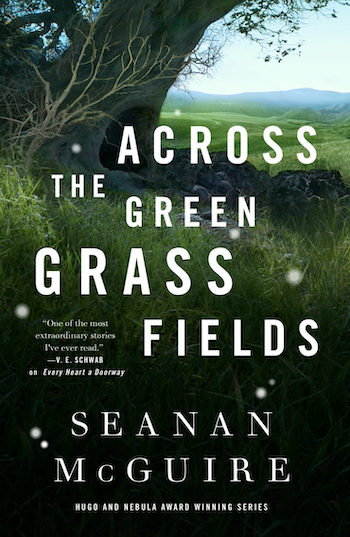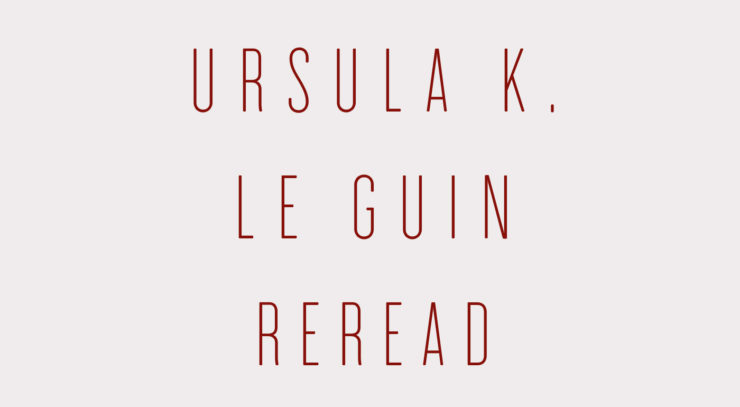A biweekly series, The Ursula K. Le Guin Reread explores anew the transformative writing, exciting worlds, and radical stories that changed countless lives. This week we’ll be covering Le Guin’s novel The Beginning Place (1980). My edition is the 2018 Tor trade paperback.
We begin a new year in the Le Guin Reread with a new decade in Le Guin’s career. At this point, by 1980, Le Guin was regarded as a master of both science fiction and fantasy. She had written her most famous novels, and with the exception of Always Coming Home (1985) and Tehanu (1990), her career is still remembered retrospectively today as having been cemented by the work she did between A Wizard of Earthsea (1968) and The Dispossessed (1974). Yet as we’ve seen throughout this reread, Le Guin’s career as a writer and thinker was far more varied than just the “highlights” of her career; the work she did in her later decades—she turned 51 in 1980—took more nuanced shapes, covered old terrain with new insights, and occasionally rethought some of the political and literary decisions she’d made in her earlier works.
The Beginning Place is one of Le Guin’s least remembered novels, not tied to any of her larger storyworlds (whether Hain, Earthsea, or Orsinia before, or the later Western Shore), and is a strange novel in its own right. Still, it is a joy to read and discover, since it connects much of her thinking about fantasy’s value as a literature for children and adults alike (as we saw argued in the essay collection The Language of the Night), with new heights of poetic prowess in the composition of the text, and with a new genre for Le Guin: the portal fantasy. It’s a surprisingly adult novel about growing up, about crossing that threshold from young adulthood into “full” adulthood—those awkward years in our early 20s when we take on new and greater responsibilities, come to terms with whatever family situation we’ve inherited, and try to figure out what the hell we want to do with the next few decades left.
The novel begins in a checkout line, with Le Guin’s prose breathlessly transforming the monotony of scanning, bagging, and cashing out customers into a poetic examination of how intricately boring humans are when ruled by market capitalism. The setting is some unnamed grocery where 21-year-old Hugh Rogers works as a cashier before he heads home to await his mother, heat up a frozen dinner, watch TV, and go to bed in order to get up and do it all over again. It’s boring, its the everyday, the kind of dead-end grind we were warned we might have if we didn’t get good grades, go to the right college, do this, that, or something else, and yet still sometimes find ourselves facing, regardless. It’s the life Hugh is stuck in, and he doesn’t seem to mind it; after all, it’s life.
But something ruptures, something breaks the monotony, something forces Hugh to flee this life all of a sudden. With a frozen dinner in the oven, Hugh decides to run from his house—to escape all the boredom modernity has built up as a wall to keep us fixed in place, checking out more groceries, rewatching the same reruns on TV. An hour later, Hugh is lost in the woods—woods that appear out of nowhere on the edge of his corner of cheapest suburbia—and he finds himself finally at peace in this place, this moment, where time seems to stand still, where the creek flows with fresh, refreshing water, and the world seems to stand still, to nestle and nurture this one human, to say, “you’re home, this is for you.” And then, worried that his mother might freak out if Hugh is missing when she comes home, he finds his way back, tosses his overbaked dinner, and gets back to normal. For a time, at least…the discovery of a place that feels wholly one’s own cannot be ignored for long, and Hugh begins plotting ways to get back, so decides to take up early-morning running (he could use the exercise, anyway).
Buy the Book


Across the Green Grass Fields
In time, Hugh makes regular morning visits to the creek and in time, too, he discovers that time is slowed there, running at 1/24 normal speed. He can frolic and snack and nap and emerge from the woods with only an hour passed, if that. Suddenly Hugh’s life is focused on the creek: getting there, enjoying his own slice of life, and escaping his overbearing mother, the checkout line, the useless repetition of the everyday. But, of course, things change. Another comes. Irena.
Irena is another early-twenty-something. She visits the creek after several years; she used to play here as a teenager and she, too, knows its secrets—only, she knows them better and more intimately than Hugh, for through Irena we discover that the creek and its time-stalling properties aren’t the end of it: they are the beginning, the place from which the entrance to another world is gained. The beginning place to Tembreabrezi, a quaint, medieval-like mountain village, nestled in a world where time is always stuck at twilight, where folks pass their lives pleasantly and adore Irena, who spent many time-dilated days there as a child. To Irena, Hugh and his happy discovery of the creek is an affront to the sanctity of the Beginning Place; he’s large, awkward, and mannish, a direct threat to the specialness of her knowledge of Tembreabrezi, and yet she’s curious about this young man, since he seems able to come and go as he pleases, but for her, the creek can only rarely be found.
Thus is the setup for Le Guin The Beginning Place, which temporarily places at odds two people who found the eponymous Place for two different reasons: Irena to escape a crappy family situation, her handsy stepfather and helpless mother, and who has only been able to find the Place again several years later; and Hugh to escape his equally crappy situation—a mother who has spent Hugh’s life running from the fact that his father left her, treating Hugh like a deadbeat, and mocking his desire to become a librarian. The singularity of the Place makes Irena jealous, but only intrigues Hugh, who ventures into Tembreabrezi after Irena tells him about it, and discovers that the mountain village views him as a prophesied hero who has come, at last, to slay a beast that has cast a curse upon the land and made it impossible for any of them to travel the roads to other villages and cities, cutting off trade and making Tembreabrezian life difficult and fearful.
This is Le Guin’s portal fantasy, usually a story-type reserved for children who, in need of something better in their lives, discover a portal to a fantasy world wherein they are special, needed, chosen, and above all wanted. This is Narnia or any of the worlds children run off to and return from in Seanan McGuire’s Wayward Children books. And just as in those novels, Le Guin’s characters are running from something, in need of something else, but unlike in many of those novels, Irena and Hugh (as adults, at least) don’t find anything fulfilling or sustaining in Tembreabrezi; it’s a fantasy, and although it feels good, it doesn’t feel right or real in the long run. Hence, Le Guin’s interesting use of “ain,” the Scots word for “own,” to describe how Irena views Tembreabrezi. She call it the “ain country” and tells Hugh she named it that as a young girl after a folk song she heard at school once, thinking that it had both the meaning of “own” (i.e. “my own”) and yet the estranged sound of something foreign, other, different, exciting.
But as Hugh and Irena discover in facing the hideous beast that has beset Tembreabrezi, and in so discovering their own trust in and feelings for one another, Tembreabrezi can’t be their ain country, it’s not truly theirs; they don’t belong, even as they prevail as its heroes. The ain country is their world—but not how and where they were raised, for no one can call their respective family situations “safe” or “home.” The ain country is the space they carve out of the monotony of modernity for themselves; upon slaying the beast, discovering true adult love for one another, and finding solace and security in one another’s embrace, they have found a new meaning of home, belonging, and togetherness. They, together, are the ain country.
Le Guin’s The Beginning Place is a portal fantasy for those of us who grow up and think through all the problems with portal fantasies, now that we’ve finally realized that maybe it isn’t possible to stay in Narnia, that maybe staying there wouldn’t be ideal. Yes, as fantasy lovers we continue to inhabit and seek out worlds like Narnia or Middle-earth or wherever else sword and sorcery call home; but we have had to face facts, put down the book, shut off the game, and go to work at some point, or else lose the security of a paycheck and necessity of a physical living space to call our own. We’ve all had to carve out something like the ain country from our less-than-ideal circumstances and many of us, myself included, are still wondering what it’s all for, how the things we’re doing are supposed to have any meaning when we seem to be going to work and cashing the paycheck so we can keep going to work and cashing the paycheck. It’s maddening, it’s boring, and it’s depressing.
So we see in Irena and Hugh two reflected personalities, two people like us struggling to make sense of why we have to do this. And we see them grow uneasy with the fantasy, defeat its evils, and discover that in the end, they don’t need to return to the people of Tembreabrezi, not even for the accolades they would surely heap at their feet for slaying the beast. Instead, they come down the mountain, hand in hand, and return to their ain country—one of their joint making, one of and for themselves. It’s a refreshing, utopian take on the portal fantasy. And, yes, like much of Le Guin it prioritizes a heterosexual monogamous relationship as the utopian solution to the crises of modernity. The Beginning Place, in the end, is a strange, self-conscious, and poetic reimagining of a fantasy subgenre that too often forgets that the problems of the real-world certainly can’t be solved by jumping through a wardrobe (if they can be solved at all), but solace and comfort and companionship can still be found out here down among the sticks and bones of this hard world we play in.
Join me in two weeks as we continue our Le Guin Reread on Wednesday, January 27 as we read the collection The Compass Rose (1982), which collects stories Le Guin wrote throughout the late 1970s. Be seeing you!
Sean Guynes is an SFF critic and professional editor. For politics, publishing, and SFF content, follow him on Twitter @saguynes.










